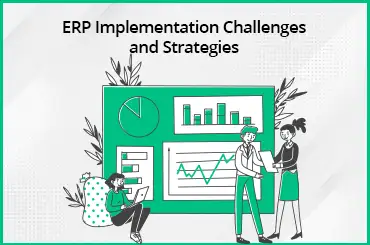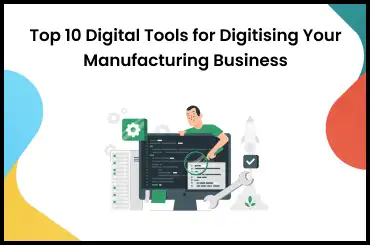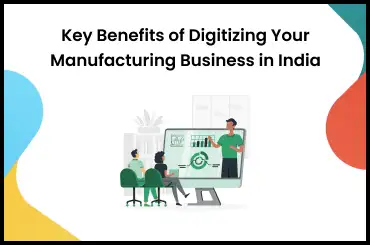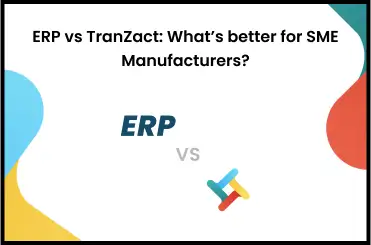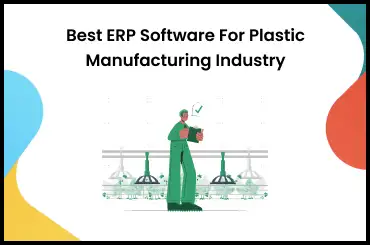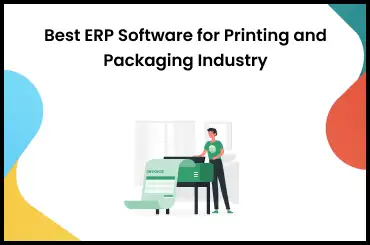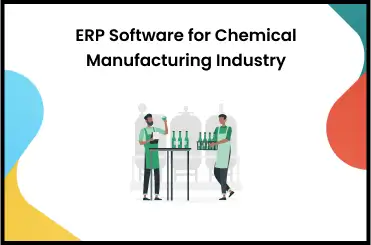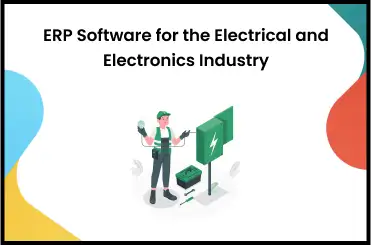A business owner of a manufacturing business is always busy firefighting. Sometimes, the invoice created has some mistake, sometimes the inventory level showing in the system is different from reality. This can delay production or stop it also. Many times, there is a gap in material requirement planning by the team or the prices quoted to the customer are not the best prices. On top of this, you need to manage your team, their salaries and so much more.
An ERP business management software can help with this. Today, ERP software has become a daily operational requirement especially for many businesses to improve productivity, reporting, cost-control, competitive advantage and quality. But these benefits can only be achieved if the business makes the right choice of ERP software.
In this blog post, we will learn what ERP business software is, the working of ERP system, functions of an ERP system, ERP implementation, ERP in procurement and its benefits for your manufacturing business.
What Is Enterprise Resource Planning (ERP)?
Enterprise resource planning is an integrated management system that automates and monitors essential procedures like manufacturing, inventory, production, accounting, supply chain management, sales, and in some cases, human resources.
An ERP uses technology and real-time automation to simplify operations and administration for business owners. It supports efficient business management by integrating many applications such as storing, collecting, and management of raw materials, production cycle monitoring and interpreting business information from various company activities with zero manual effort. Modern ERP business software solutions are built on cloud-based technology for increased business productivity. Cloud-based ERP applications also let you access data from any location, easily.
What Is An ERP Software?

Enterprise resource planning software is a complete and automated system that is used on-premises, or on the cloud to manage all aspects of a business. Along with primary functions such as accounting, ERP systems can help with inventory, financial administration, supply chain management, production and manufacturing operations.
A manufacturing ERP software helps to plan, predict, budget, and report concise, data-driven information to the management. The shared transactional information from various businesses helps the ERP software to prevent and eliminate data duplication, and ensure data integrity within a single platform.
ERP software offers transparency and control over multiple functions of the business. ERP systems and software provide several functions for large, medium-sized, and small organizations, along with industry-specific customizations to reduce manual dependency and enhance business growth. As automation and technology are becoming easily accessible today, the use of ERP software has increased.
How Do ERP Systems Work?

An ERP software system brings together complex business processes in a simple manner.
- ERP business software automates many business processes into a single system. This improves collaboration, quality and customer satisfaction.
- It integrates with other existing systems. This helps different team members to work together collaboratively. This also helps with accuracy and prevents data duplication.
- It provides business intelligence reports and data driven insights. This helps to manage small to large operations effectively.
Why Is ERP Important For Your Business?
A good ERP system can help your company use automation with cloud abilities, improving everyday tasks. Using ERP technology you can manage reporting and analytics without third-party involvement. This helps you improve production and inventory systems, and get better data security. ERP software management usage attracts next-generation, skilled workforce who prefer seamless manufacturing technology.
But for an SME manufacturing business, the use of an ERP system might be expensive. As an SME business owner, you might not need all the modules provided. Also, many ERPs can be difficult to learn as they use very advanced technology. They can also include very long implementation timelines.
Functions Of ERP
After learning about what is ERP automation, let's now learn about ERP functions and features.

1. One Place for All:
ERP software offers user-friendly tools to manage orders, deliveries, sales and shipping processes. It also ensures that all transactions are auto-listed in the ledger, out-of-stock items are well managed, and orders are shipped on a timely basis.
2. Sourcing and Procurement:
ERP helps to secure materials and components needed for production from suppliers. It helps to maintain a list of approved vendors and tie them to specific products helping with efficient supplier relationship management. It automates quotation requests, and tracks incoming and outgoing inventory.
3. Manufacturing Execution System:
An ERP designed for manufacturing enterprises, leverages a manufacturing execution system that helps to plan production. This makes sure of the availability of raw materials and machinery capacity, updates the status of goods-in-progress, and more. With this, companies can easily track final manufacturing output against forecasted production charts.
4. Supply Chain Control:
This feature in ERP tracks overall supply and goods movement from sub-suppliers, to suppliers to manufacturers, including distributors and retailers. It manages returned products for replacement or refund. It also includes collaboration with procurement, order management and warehouse management.
5. Sales and Purchase:
With an effective ERP sales module, SMEs can drive more leads and track customer enquiries. They can also automate the process of customer notifications to make sure customers are always in loop and are satisfied with delivery.
6. Finance:
ERP with finance allows businesses to assess their current financial dashboard and improve future plans. It helps to track accounts payable, accounts receivable and manages the general ledger. It creates and stores financial data like payment receipts, balance sheets, and tax statements. An ERP software integrated with accounting, also automates vendor payments, billing, account reconciliation, and cash management tasks so that the accounting department can close the books on time, and comply with relevant revenue recognition standards.
7. Human Resources:
Certain ERP software also offer detailed records of employees and documents regarding performance reviews, job descriptions and more. It also tracks working hours, paid time-off (PTO), sick days, and employee incentives for effective human resource management.
Benefits Of ERP
Below are some benefits of ERP system to help in determining its value for business:
- Provides real-time updates on a centralized and integrated database for all processes.
- Provides access to all information related to the customer to improve CRM.
- Helps with on-time delivery and higher quality of goods.
- Helps to identify the amount of stock present in inventory reducing chances of overstocking or understocking.
- Offers automatic invoicing to help with seamless payments and collections.
- Streamlines procurement management for companies along with multiple other services such as material requirements planning, production support and accounting tools, all under one platform.
- With cloud ERPs, you can be assured of high security and data safety.
- Reduce production bottlenecks by helping with effective lean inventory and demand forecasting.
- Help to achieve business transparency and ease of transactions across all your vendors.
- Help to implement smarter workflows and easily automate routine and manual tasks.
Difference Between ERP And Financials
Financials cover business cash flow, including accounting and fund management, and revenue management reported by different departments.

Financials:
- Includes all functions of a business's finance department.
- Include modules for accounting, revenue management, payables, receivables, asset management, project management, and more.
- Use analytical tools to meet government reporting standards like IFRS.
- Produce periodic financial statements for public organizations and reports for the CFO.
ERP:
- Manages core business operations including finances, including supply chain, procurement, production, inventory, and maintenance.
- Integrates project management, product lifecycle, logistics, performance, risk, and human capital management.
- Links with CRM (Customer Relationship Management) solutions for a complete consumer overview.
- Cloud-based ERPs offer advanced tools like digital assistants and business intelligence dashboards.
- Centralizes enterprise management, involving CIO, CFO, COO, and other leaders.
Financials and ERP are related but different. Financials being a subset of ERP.
Why Should You Move To Cloud ERP Solution?

Businesses across India have recognized the growth that an ERP can facilitate. Using ERP cloud solutions can accelerate several business functions for you. Following are the reasons why you should move to a cloud ERP solution:
1. Modern cloud abilities
Real-time design and a flexible business model enables cloud-based ERP systems to improve functionalities without needing to be updated manually and periodically, unlike legacy systems. Also, without any manual dependencies on users, ERP systems can automatically process inter-connected data and inputs for easy decision-making.
1. Modern Cloud Abilities: Real-time design and automatic updates help to improve functionalities without manual updates. This helps with easy decision-making.
2. Value Addition: The cloud helps businesses to operate faster with reduced costs, higher speeds, and better infrastructure. This helps with faster growth.
3. Reduce Third-Party Dependencies: Cloud ERP systems offer built-in analytics and reporting. This removes the need for external vendors.
4. High Flexibility: Cloud applications allow easy data migration and customizable features to meet unique business needs.
5. Improved Collaboration: Continuous updates and a centralized database improve teamwork and communication, making sure of accurate data flow.
6. Excellent Security: Cloud ERP solutions use trusted platforms with encrypted servers to safeguard business data from threats and loss.
To learn more, read here - Benefits of Cloud Enterprise Resource Planning (ERP)
ERP Implementation Challenges

Implementation of an ERP system comes with challenges as discussed below:
- ERP implementation involves phases of research, discovery, planning, design, development, and testing. This process can be long and filled with more hurdles.
- Changing and moving large data repositories into new operations can be challenging.
- System changes can cause workflow disruptions, posing challenges during ERP implementation. This can also lead to business loss.
- ERP costs rise with the facilities provided, including third-party add-ins, training, and maintenance. This could make it difficult to afford.
- Selecting ERP software solution based on business needs is important. If you choose the wrong software, your money could be wasted.
- Complex data conversion requires a strategy, time, and effort from all verticals. If teams are not aligned, there could be challenges and conflicts.
- Poor data conversion can increase costs and cause delays. This could cause loss of revenue.
- Training staff for new software integration can be costly and time-consuming, delaying other business processes. There could also be resistance to change making it more difficult.
ERP Integration

ERP integration connects ERP software with other internal systems, such as integrating inventory management with sales, purchase, and production. This allows for effective analysis of stock levels and inventory valuation, improving productivity through automation, real-time reports, and secure data access. It also manages dead stock and real-time inventory valuation, improving overall business efficiency.
How To Choose The Best ERP System?
To choose the best ERP system, understand your company's needs. After that, find an ERP solution provider that offers relevant services and customization. Make sure integration with existing software works.
Choose a reputable vendor by reading online reviews. Consider the total cost, including implementation, customization, add-ons, maintenance, training, and hidden costs.
Access The Best ERP Solution With TranZact
Better than ERP for Indian SME Manufacturers: TranZact
While an ERP might be a good solution, it might not be the best for an Indian SME Manufacturer. There are many modules in an ERP system and as a business owner of an SME you might need only some of them, especially the ones that can streamline your manufacturing processes from enquiry to dispatch. TranZact can help you with customizable features and several integrations.
TranZact is a zero-effort, cloud-based business automation software that provides solutions and modules specifically designed for Indian SME manufacturers. With TranZact, you can access many custom ERP functions and also a lot more. It has 5 modules - sales, purchase, inventory, production and planning. These help you take control over more than 80% of your manufacturing business, with ease.
Choose TranZact if you are a business owner of an Indian SME manufacturing company.
FAQs on ERP Software
1. What is ERP Software?
ERP or Enterprise Resource Planning software, is a comprehensive and integrated system that enables organizations to manage and automate their core business processes. This includes management of inventory, production, manufacturing, accounting, customer relationship management, and more on a centralized platform for better decision-making.
2. What is an example of ERP Software?
An example of an ERP software provider is TranZact, which integrates inventory, production, material requirements planning, sales, purchases, and more. TranZact enables SMEs to automate processes and grow with its cloud-based ERP platform.
3. What is the importance of ERP?
The importance of ERP lies in its ability to streamline core business processes for efficient data management, and improved collaboration in the business. By providing a centralized system, ERP enhances productivity and reduces operational costs. It helps organizations gain a competitive edge in today's dynamic business environment.
4. What is ERP in accounting?
In accounting, ERP (Enterprise Resource Planning) refers to the software and systems that help manage and integrate financial processes within an organization. It encompasses functions such as general ledger, accounts payable, accounts receivable, financial reporting, and budgeting, providing a comprehensive solution for financial management and reporting.
5. How does ERP software work?
ERP software works by integrating different modules that correspond to specific business functions, such as finance, human resources, inventory management, manufacturing, and customer relationship management. It facilitates data to flow seamlessly between departments, increasing productivity.
6. Is ERP suitable for SMEs?
Yes, affordable ERP software like TranZact can benefit small businesses by improving efficiency, automating operations, and minimizing costs. TranZact is an intuitive ERP solution that caters specifically to the needs of small businesses.
7. Is ERP software secure?
Trusted ERP software is highly secure as it typically includes security features such as user access controls, data encryption, audit trails, and regular security updates to protect sensitive business information.
8. How much does an ERP cost?
ERP software price may range between ₹10,000 and ₹10 Lakhs, depending on the features, number of users, functions, and other factors. The price may also be lower or higher based on the expertise of the ERP tool and its credibility in the industry.
9. What are the 3 common types of ERP software?
The most common types of ERP software are cloud ERP, on-premise ERP, and hybrid ERP, which is a combination model of a cloud and on-premise ERP.
10. Which is the best ERP software for manufacturers?
TranZact provides the best manufacturing ERP solutions with production planning, management, reporting, and inventory solutions. It offers a real-time overview of raw material availability and machinery capacity for efficiency in manufacturing processes.
As a free ERP software, TranZact provides a lifetime free sign-up with all base features, available for an unlimited free period. Advanced features can be availed only when your business is ready.








